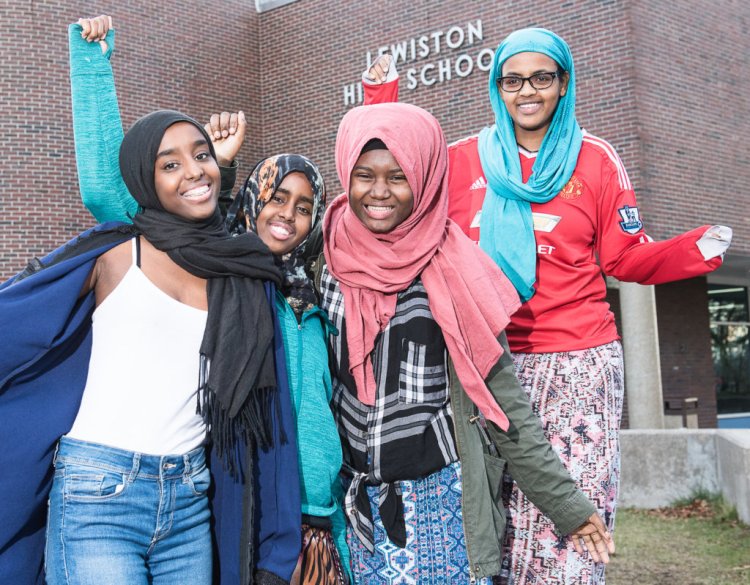LEWISTON — A group of Lewiston High School students has won a $113,000 grant to create a new position at the high school to decrease detentions and turn disciplinary cases into “teaching moments.”
The students, leaders for the 21st Century after-school program, have been awarded the restorative practices grant from the John T. Gorman Foundation, the foundation said Wednesday.
“When I first heard we got the grant, we did a little dance. We’re excited,” said Fadimatou Katou, 18, a senior.
The students started the project two years ago after attending a restorative practices event in Bangor offered by the Maine Youth Action Network. The Lewiston students discovered not all high schools discipline the way their school does.
“We wanted to change our school, to make a difference,” said Bisharo Odowa, 17, a senior. “We never thought it would be this big.”
Fadimatou Katou hopes the grant will help change how students are disciplined. “Talk to them more, punish them less, build relationships,” she said.
Restorative practices is a growing trend that involves finding ways to have students learn from their mistakes rather than just receiving punishment.
Odowa said she’s been given detention for being late for school.
“You just sit there. Then nothing happens … you don’t learn anything from what you did,” she said.
Students who are late may have a good reason, she said, but students aren’t heard. “The disciplinary system needs work.”
Lewiston High School Principal Jake Langlais said the grant will allow a restorative practices coordinator to be hired, possibly in the spring, and money for student leadership and staff training.
“We are in a planning year,” he said. “I’m really excited. We will take a look at our policies and practices.”
Like a lot of schools, detention is a long tradition at Lewiston High, but it doesn’t work, said Langlais, who was middle school principal last year and started as high school principal this fall.
As he came to the high school “one thing I’ve struggled with is how detention can escalate,” he said. A student gets detention for being late or skipping class. If they skip that detention, they get another detention. It can snowball until the student has an in-school suspension.
“That sequence doesn’t make a lot of sense,” he said. And the student has learned nothing. Students get detention for unexcused tardiness, skipping class, academic dishonesty, classroom disruptions or misuse of hall passes.
Restorative practices is an approach of “how do we instill good decision-making with the kids.” Bad behavior is treated more like a “teaching moment” with guidance to help students understand how to make the right decisions, and will come to it on their own in the future, Langlais said.
A coordinator will bring a different set of eyes to the school, looking at policies and ways things could be done differently to support students, Langlais said.
It’s effective, but time-consuming, which is why a coordinator is needed, he said.
The 21st century students researched their school culture last year and surveyed students. They were invited by the Gorman Foundation to apply for a grant.
Langlais helped them apply for the grant. Jenn Carter, director of the 21st Century program, said students received support from Langlais, Superintendent Bill Webster and Assistant Superintendent Shawn Chabot, the former principal at Lewiston High.
The John T. Gorman Foundation is committed to improving school performance in Maine, Senior Associate Sara Gagne Homes said in a statement emailed to the Sun Journal.
The foundation has supported similar a restorative practice model at Lewistion’s Longley and Montello elementary schools that “has since shown impressive results,” she said. The foundation is thrilled to help restorative practices expand to the high school, she said.
“Sometimes you have to look outside the box to find the solution that works,” Gagne Homes said.
Send questions/comments to the editors.


